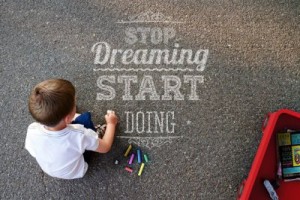Why Your Childhood Dream Still Matters


Many children hope to grow up to become doctors, scientists, teachers, or astronauts. Approximately 9% of people actually achieve these dream professions, although 21% do end up having a career in a related field. It is all too common (and sometimes unfortunate) to abandon your dreams as you get older. Maybe you develop new skills or interests that divert your path, or become more practical by realizing that the goal was a little far-fetched or too demanding to pursue. I was the son of a college professor, both my parents worked for universities in Boston, and yet all I wanted to do was open my own business. I was obsessed with sports and music, so I thought I should open “Cutter’s Sporting and Music Goods”… I still think it’s a great name – maybe one day I will live that one out. It’s never too late, right?
Check out this nifty infographic I stumbled upon as well that reiterates that adage. Some of the largest corporations in the world (Walmart, Ford, Coca-Cola) were all discovered by people who were 40 or older. Puts things in perspective, doesn’t it? You never know what you can accomplish until you set your mind to it. So, just because you aren’t currently in your “dream job,” it doesn’t mean your daydreaming was pointless or immature. There are boundless ways to utilize your childhood imagination for practical planning in your present career. Even if the job itself is no longer relevant, you may be able to find the underlying zeal that drives you. Say that on the surface you wanted to be a pilot or the president, but if you dig deeper, hidden truths can arise. Ask yourself why you were so set on this profession. What specifically was it that caught your interest? What did success look like in your young mind? Maybe you were drawn to leadership or helping others. Maybe it was important to work with a team rather than individually.
 You should also be prepared to answer the “ideal job” question in an interview. This can be a difficult one to summarize, but this question allows your interviewer the opportunity to get to know you better, or figure out how you may fit in the role or company. Ideally, your answer will align somehow with the job description (consider mentioning your relevant skills and how they will help you along your path to success.) Whatever it is, your ultimate job can give clues to what you are passionate about, how ambitious you are, and what your career goals consist of. We are generally passionate about careers that connect back to our true talents, so this response can also speak to inherent abilities. Personally, after high school I spent two years traveling abroad and witnessed firsthand how much calamity and hardship there was in the world. I felt compelled to help and dedicate my life to assisting disadvantaged people, whether poverty-stricken, mentally disabled, or immigrants looking for a better life. I completed my Master’s in Social Work and worked for two years at various agencies in NYC. After a while, I started to feel conflicted – while I enjoyed helping people, I felt a strong pull back to my childhood ambitions of owning my own company.
You should also be prepared to answer the “ideal job” question in an interview. This can be a difficult one to summarize, but this question allows your interviewer the opportunity to get to know you better, or figure out how you may fit in the role or company. Ideally, your answer will align somehow with the job description (consider mentioning your relevant skills and how they will help you along your path to success.) Whatever it is, your ultimate job can give clues to what you are passionate about, how ambitious you are, and what your career goals consist of. We are generally passionate about careers that connect back to our true talents, so this response can also speak to inherent abilities. Personally, after high school I spent two years traveling abroad and witnessed firsthand how much calamity and hardship there was in the world. I felt compelled to help and dedicate my life to assisting disadvantaged people, whether poverty-stricken, mentally disabled, or immigrants looking for a better life. I completed my Master’s in Social Work and worked for two years at various agencies in NYC. After a while, I started to feel conflicted – while I enjoyed helping people, I felt a strong pull back to my childhood ambitions of owning my own company.
In my subsequent interview process, I met a friend who suggested I become a recruiter. I had no idea what a recruiter did, but decided it was worth checking out. I ultimately met my mentor and boss Dan Nascimento, who promised me that recruiting could mesh both of my aspirations in one – assisting others, while being the master of my own financial success. When I was conflicted between offers of social work and recruiting, Dan told me; “Alan, winners make decisions. You have 48 hours.” Well, we all know where my path led me after that and 18 years later, I have never looked back.
I truly believe that I could not have chosen a field better suited for me. Each day, we receive thank you notes, flowers, bottles of champagne and more from people thanking us for helping them land that coveted job. I am also still extremely active with multiple nonprofits to aid in other important causes I care about. We all need a dream. We simply need to look around the world, and find what speaks to us. Once you know what it is, you should write a 5-10 year plan to get you there. Excellence does not come overnight. Hard work and dedication will get you there. Stop dreaming, and start doing. So when you are posting your next #TBT Instagram photos, or going down memory lane with family members/friends, think back to that little tike and what he/she wanted to be when they grew up. More importantly, analyze why.
What was your childhood dream job? Let me know in the comments!

